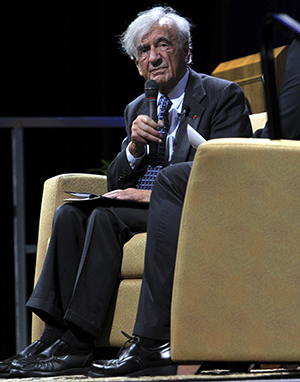Bringing hope, Elie Wiesel speaks at Kent State

Professor and Holocaust survivor Elie Wiesel speaks on April 10 in the MACC about his life and his experiences during the Holocaust. Wiesel is a professor at Boston University and a published author best known for his memoir, “Night.” Photo by Adrianne Bastas.
April 11, 2013
Twenty-four years ago, on April 11, Elie Wiesel came to Kent State for the first time. Forty-four years before that on April 11, 1945, Elie Wiesel became a free man after the U.S. continued to evacuate Buchenwald, a former concentration camp during Nazi Germany.
Elie Wiesel is a Holocaust survivor, Nobel Peace Prize winner, Boston University Professor and author of the book “Night,” a story on his day to day struggle as a prisoner in the Auschwitz, Buna and Buchenwald concentration camps.
“We had lost every concept to feel,” Wiesel said on his time as a prisoner. “We did not know what it was like to be free.”
Wiesel came to Kent State Thursday as part of the Presidential Speaker Series, and his visit also happened to coincide with Holocaust Remembrance Day on April 8.
“The moment we stop remembering, we stop believing,” Wiesel said. “I believe in memory because without it nothing is possible.”
One of the major themes of Wiesel’s speech was the importance of having hope and his struggle with believing there is such a thing.
“Where there is no hope, our road and our path is to invent it,” Wiesel said. “I am here to teach you my hope because without it, I wouldn’t be here today.”
Since surviving the Holocaust, Wiesel continues to travel around the world trying to bring attention to places where human rights are being violated. When he is not traveling, Wiesel is teaching in the departments of philosophy and religion at Boston University.
“Every year, he came and gave a lecture that was free and open to the public,” said Bernice Borison, a retired social worker originally from Boston who came to hear Wiesel speak. “I would stand in line for hours just to hear him speak.”
Another theme of Wiesel’s speech was the importance of speaking and doing more in order to cause change.
“For every word that a holocaust survivor writes, there are 10 more that haven’t been written,” said Wiesel. “Whoever listens to a witness becomes a witness.”
Tickets for Wiesel’s speech went on sale on Feb. 1. It was soon sold out with more than 3,000 people in attendance.
“Listening to his perspective on hope can change its perception for some,” said James Pazol, a Youngstown attorney with tears in his eyes. “It just touches some chords because, for me, there will always be hope.”
U.S. soldiers liberated more than 21,000 prisoners in Buchenwald on April 11, 1945, according to the United States Holocaust Memorial Museum’s website. Elie Wiesel was one of them.
“I believe in the virtue of gratitude,” Wiesel said. “Simply to say to each other, thank you.”
Contact Celia Fernandez at [email protected].











